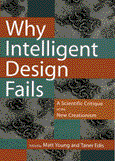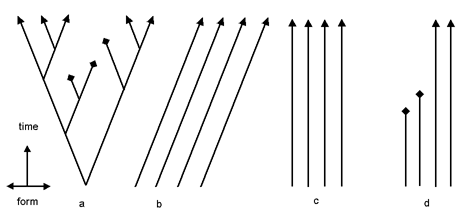
Why Intelligent Design Fails.
Rutgers University Press.
hardback 2004
paperback 2006.
|
| | Matt Young and Taner Edis (2004) Why Intelligent Design Fails: A Scientific Critique of the New Creationism. | |
| | Contents | vii |
| | Preface (available online) | ix |
| | Acknowledgments | xiii |
| | Introduction (Matt Young and Taner Edis) | 1 |
| | A handy overview and summary of the chapters | |
| 1 | Grand Themes, Narrow Constituency (Taner Edis) | 9 |
| | A characterisation of the Intelligent Design movement. | |
| 2 | Grand Designs and Facile Analogies: Exposing Behe's Mousetrap and Dembski's Arrow (Matt Young) | 20 |
| | Behe's mousetrap analogy and Dembski's arrow analogy are wrong. Therefore the entire argument based on the analogies fails. | |
| 3 | Common Descent: lt's All or Nothing (Gert Korthof) | 32 |
| | Here I argue that anything less than full common descent leads to an arbitrary fragmentation of the tree of life, leads to a logically inconsistent theory of descent, and conflicts with the evidence. Summary. Updated version of the chapter | |
| 4 | Darwin's Transparent Box: The Biochemical Evidence for Evolution (David Ussery) | 48 |
| | David Ussery examines Behe's definition of irreducible complexity and finds that Behe makes contradictory claims about the number of essential parts of an IC system. Therefore, it cannot be established whether that system is IC. | |
| 5 | Evolutionary Paths to Irreducible Systems: The Avian Flight Apparatus (Alan D. Gishlick) | 58 |
| | The avian flight system provides an excellent example of how an irreducibly complex system evolves by small steps through selection of different functions, a series of functional and morphological changes detailed in the fossil record of dinosaurs. | |
| 6 | Evolution of the Bacterial Flagellum (Ian Musgrave) | 72 |
| | Flagella are indeed Irreducible Complex systems, but they can evolve by mutation and natural selection from simpler systems through a series of functional intermediates. | |
| 7 | Self-Organization and the Origin of Complexity (Niall Shanks & Istvan Karsai) | 85 |
| | Self-organization as a pathway to irreducible complexity. Social wasps construct complex paper nests that give the misleading appearance of being intelligently designed. | |
| 8 | The Explanatory Filter, Archaeology, and Forensics (Gary S. Hurd) | 107 |
| | I will show why archaeology and forensics cannot be used to legitimize Intelligent Design Theory by examining the application of Dembski's Explanatory Filter in archaeology and forensics. | |
| 9 | Playing Games with Probability: Dembski's Complex Specified Information (Jeffrey Shallit & Wesley Elsberry) | 121 |
| | Dembski's specified complexity is an incoherent concept. It is unworkable and not well-defined. Specified Complexity does not provide a way to distinguish designed from undesigned objects. | |
| 10 | Chance and Necessity - and Intelligent Design? (Taner Edis) | 139 |
| | Chance and necessity are sufficient to explain the complexity in our world. The combination of chance and necessity is genuinely creative. Human intelligence and evolution can create complexity. | |
| 11 | There Is a Free Lunch after All: Williarn Dembski's Wrong Answers to Irrelevant Questions (Mark Perakh) | 153 |
| | Here I will discuss the chapter 'Evolutionary Algorithms' concentrating on Dembski's use of the No Free Lunch theorems and on his discussion of the displacement problem. | |
| 12 | Is the Universe Fine-Tuned for Us? (Victor J. Stenger)  | 172 |
| | A wide variation of the fundamental constants of physics leads to universes that are long-lived enough for life, even though human life need not exist in such universes. See also: The Fallacy of Fine-Tuning: Why the Universe Is Not Designed for Us by Victor J. Stenger (2011). | |
| 13 | Is Intelligent Design Science? (Mark Perakh & Matt Young) | 185 |
| | The authors examine whether ID is pseudoscience. | |
| | Appendix. Organizations and Web Sites (Gary S. Hurd) | 197 |
| | References | 207 |
| | About the Contributors | 223 |
| | Index | 227 |
| | | |
|
| |
Summary
Chapter 3: Common Descent: lt's All or Nothing
This chapter is written for all those who believe that it is possible to accept something less than full common descent of all life.
Here I argue that anything less than full common descent leads to an arbitrary fragmentation of the tree of life, leads to a logically inconsistent theory of descent, and conflicts with the evidence.
The creationist model of the origin of species (Paul Nelson) claims independent creation of organisms at the family level. This creation model implies inclusive groups (groups-within-groups) for the family-genus-species levels, which are related by common descent. All groups above the family level are independent exclusive groups, which are not related by descent. However, higher groups like Carnivores, Mammals and Vertebrates are also inclusive groups (groups-within-groups). The creation model is incompatible with the taxonomic inclusive groups and has no explanation for the pattern of similarities/dissimilarities of those groups, while Darwin explained them elegantly by common descent. Therefore, the creation model fails.
Errata
- page 33, Figure 3.1 "After Pennock (2002, 685)" is listed in the References as Pennock (2001),
while I used the second printing of 2002.
- page 34, Figure 3.2 After Ridley (1995,1996) must be: "(a) evolution (b) tranformism (c) fixed species (d) fixed species + extinction. a-c after Ridley (1985), d after Ridley (1996)". So it means the figure is a composite figure from two books.

- Note: errors are corrected in the second printing of the book. The appendix of internet site URLs and descriptions was updated in the paperback edition.
Reviews
- Short review of the book in the NewScientist.
- A 3 page review by Jan Willem Nienhuys of Why Intelligent Design Fails appeared in the Dutch skeptics magazine Skepter, 17.3, autumn issue 2004 (paper edition) [ 31 Oct 2004 ]. The translated version is online [ 3 Nov 2004 ].
- Has the jury reached a verdict? is a review of Why Intelligent Design Fails by Stephen A. Haines. [ 28 Jan 2005 ]
- Cornelius Hunter (2005) Can science refute design?, Origins, Number 58 p.37-39. A 3 page review of WIDF [ 2 Jul 2005 ]
- A very useful review by Paul Gross: Patience and Absurdity: How to Deal with Ingelligent design Creationism. A review of Why Intelligent Design fails. e-Skeptic #40 October 29, 2004. This review also appeared at this site.
- A great review in Quarterly Review of Biology 80(3), 350 (2005) by philosopher Arthur Falk. [ 22 Oct 2005 ]
- A review by evolutionary biologist Massimo Pigliucci (2005) MORE THAN YOU EVER WANTED TO KNOW ABOUT INTELLIGENT DESIGN, Evolution: Vol. 59, No. 12, pp. 2717-2720. (with 3 other books reviewed). [ 16 Jan 2006 ]
- David Sepkoski (2006) 'Worldviews in Collision: Recent Literature on the Creation-Evolution Divide', Journal of the History of Biology (2006) 39:607-635. (contains 5 book reviews about C/E controversy including WIDF). Quote: "Gert Korthoff's chapter on the failure of creationists to establish plausible alternatives to common descent is another highlight of the book" ('Korthoff' must be: 'Korthof'). [ 14 Nov 2006 ]
- Book review by Anthony Campbell 19 March 2007
- Review The above review was contributed by: Evelyn Sears in BookPleasures.com 8 Mar 2007. "Why Intelligent Design Fails is a well-written book that does not descend into dogma or ad hominem attacks".
- Lady Book Notes blog reviews Why Intelligent Design Fails, Thursday, March 08, 2007 (this review is the same is the one in BookPleasures.com).
- Austin Cline, Review of Why Intelligent Design Fails, undated. Accessed: 10 Jun 2007.
- WIDF reviewed by Angus J. L. Menuge, Professor of Philosophy, in: Politics and the Life Sciences 27(2):52-54. 2008.
Angus J. L. Menuge is a well-known Intelligent Design creationism advocate who has worked closely with the
Discovery Institute. [ 17 Feb 2009 ]
Angus J. L. Menuge:
"A chapter by Gert Korthof (ch. 3) argues that Darwin's account of common descent is the only way to make
sense of why different creatures "share characteristics" (p. 38) and hence of biological taxonomy. However, as Simon
Conway Morris has argued, many features thought to be homologies do not result from a common ancestor but are independent effects of convergent evolution (2). And several scientists have argued that life more closely resembles a web or net
than the single branching tree proposed by Darwin.(3)"
Menuge ignores the stated purpose of the chapter: "In my view, anything less than full common descent leads to an arbitrary fragmentation of the tree of life, leads to a logically inconsistent theory of descent, and conflicts with the evidence" (p.32). Convergent evolution and a web at the base of life do not contradict in any way the idea that all life is genetically connected. 'Full common descent' does not mean an exclusion of a 'web of life', but means that all genetic material is inherited vertically or horizontally or both. The path of horizontally acquired genetic information can be traced with the same DNA techniques as vertically transmitted genetic information. Apart from this, how does convergent evolution support ID? How does a web or net support ID? Neither does. His remarks fail as a defence of ID and as a criticism of naturalistic evolution. [ 18 Feb 2009 ]
|
See also the criticism of Mark Perakh A few more words about a creationist's Review of WIDF Anthology. [ 23 Feb 2009 ]
Further Reading
- Book info from the publisher.
- [Introduction] Preface, Table of Contents, Reviews of Why Intelligent Design Fails by Taner Edis.
- Buy hardback Why Intelligent Design Fails at a 20% discount for $31,96 from Rutgers University Press. In Paperback (2013): $24.95 . There is also a
- Amazon info of Why Intelligent Design Fails: hardback ($39.95 Oct 2004) ($34.43 Dec 2005)
- Paperback 'Why Intelligent Design Fails' at Amazon: $24.95. [ 19 Feb 2006 ]
Paperback: $22.46 (2013) [ 31 Aug 2013 ]
- Promo material on a page of author Wesley R. Elsberry.
- Het besproken boek is te leen bij Library of the Utrecht University (Uithof). (Nov 2004).
- The book is 'Book of the Month' at The Secular Web Jan 2005.
- Martin Neukamm Die kreationistische Grundtypenbiologie in der Kritik - Warum es keine empirisch-wissenschaftliche Schöpfungsforschung geben kann. Skeptiker 18 (4) 2005, 144-150.
- Paperback 'Why Intelligent Design Fails' available from Rutgers University Press for $19.96 [ 20 Feb 2006 ]
- The WIDF chapters by Musgrave and Ussery are mentioned in: chapter 8 of Francisco Ayala (2007) 'Darwin's Gift to Science and Religion'. Please note the 2007 book is an extension of Ayala (2006) 'Darwin and Intelligent Design'. Therefore, I guess Ayala (2006) will also contain references to WIDF. [ 26 Aug 2007 ]
- The following open access PNAS article cites WIDF: Renyi Liu, Howard Ochman (2007) 'Stepwise formation of the bacterial flagellar system', Open Access article PNAS, April 24, 2007 in note 16. [ 26 Aug 2007 ]
- The book Why Intelligent Design Fails is mentioned in the evolution textbook Freeman and Herron (2007) 'Evolutionary Analysis', fourth edition, section Exploring the Literature, Chapter 3, page 107. [ 29 Aug 2007 ]
- The book Why Intelligent Design Fails is mentioned in the evolution textbook Barton et al (2007) 'Evolution', chapter 3, Further Reading, page 83 (see under Pennock reference!). [ 29 Aug 2007 ]
- Sahotra Sakar (2007) Doubting Darwin? Creationist Designs on Evolution. Wiley-Blackwell
- Matt Young, Paul K. Strode (2009) 'Why Evolution Works (and Creationism Fails) Rutgers University Press Paperback (Info)
|


